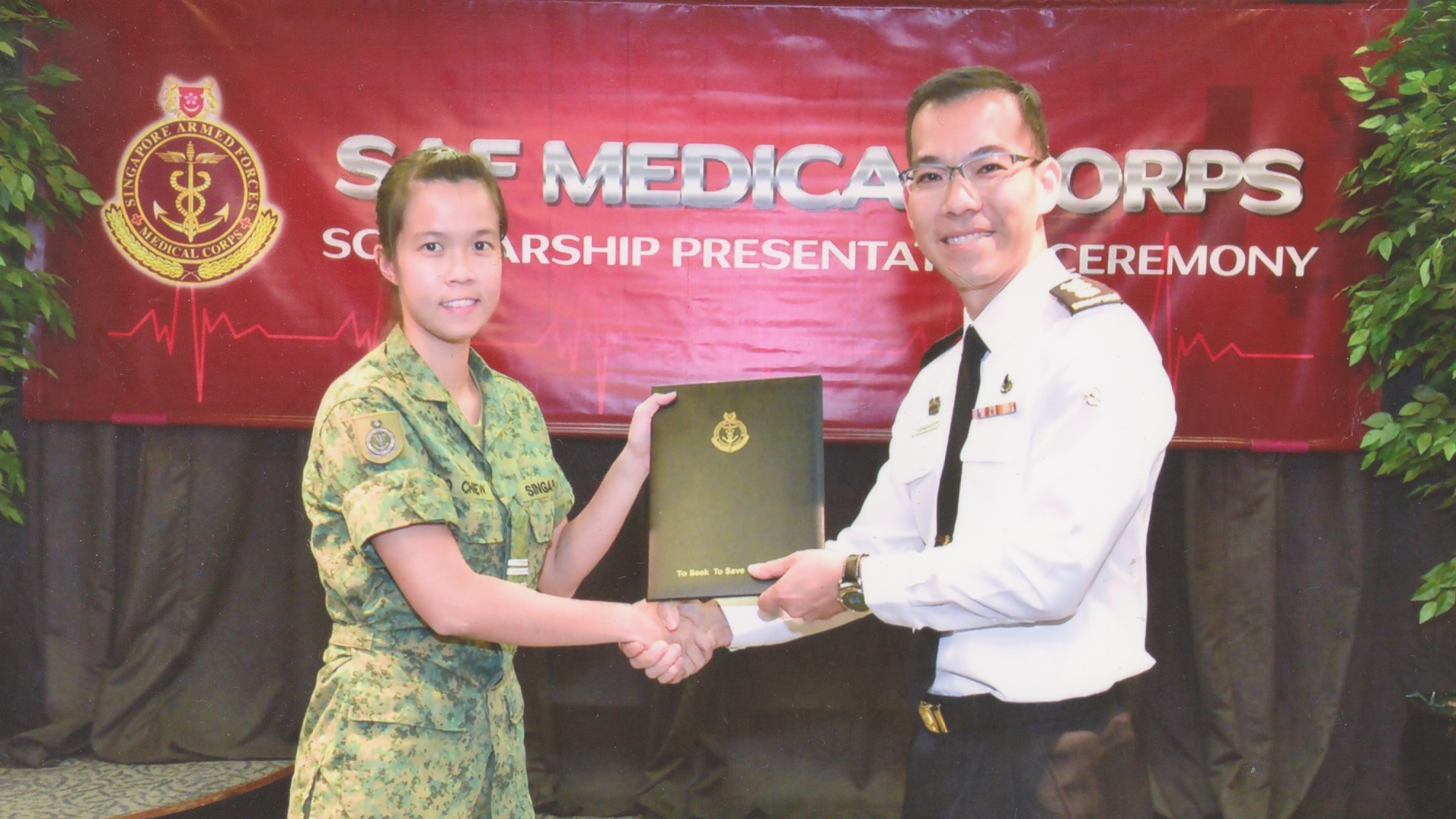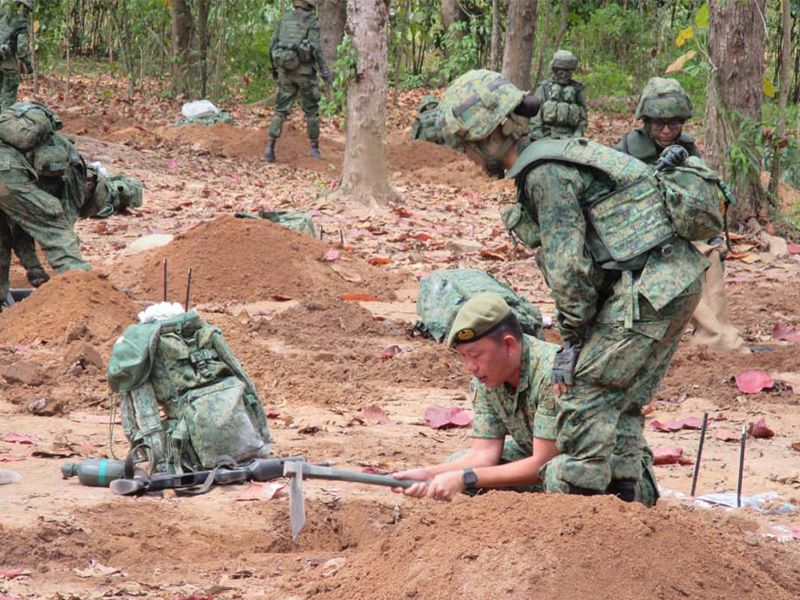Answering Military Medicine’s Call
Martial artist, footballer, soldier, medical student. At 22, Chiew Wen Qi lives life con brio.
The 22-year-old Phase III student at NUS Yong Loo Lin School of Medicine is the only girl in her batch to sign on with the Singapore Armed Forces (SAF) under the SAF Medicine Scholarship. There are eight male SAF Medicine scholars in her cohort. The scholarship allows Wen Qi to pursue medical studies locally and embark on a career as a commissioned medical officer in the SAF Medical Corps.
Wen Qi’s interest in the military began in secondary school. Her taekwondo instructors, whom she trained twice a week with, were army regulars. They believed in tough training. “We always began with a 2.5-kilometre run as warm up, and my coaches would shout at us when we were tired and wanted to give up. But they would not give up on us, so they kept shouting at us. All the instructors were very passionate. They would motivate you to continue even though training was very tough,” she said.
However, the rigorous training was not a turnoff for Wen Qi. In fact, it piqued her interest in the army.
“My instructors always shared stories about their time in the army, and they seem to take a lot of pride in their National Service (NS) days. So through them I got to know more about how it’s like in NS, and I slowly got more interested in it.”
That interest burned brightly. When Wen Qi attended her junior college’s career fair after her first-year preliminary examinations, she spotted the SAF Medicine Scholarship booth and enquired about the scholarship.
“I realised that, apart from being a doctor, the scholarship allows me to be part of the military, and I get to kill two birds with one stone,” Wen Qi said.
She signed up soon after, though her mother was not pleased about it. Girls don’t become soldiers, that’s men’s stuff, she sniffed.
“My mother was quite resistant. She asked me why don’t I just be a normal doctor, instead of a soldier. But my father is supportive, because he has been through NS, and he thought it is worth the effort. He helped to convince my mum, and eventually she gave in after nagging at me for a few weeks,” Wen Qi said. “My mum was very proud of me when I graduated from Basic Military Training (BMT).”
Before entering medical school in 2015, Wen Qi spent nine weeks in BMT and another three months at the SAF Officer Cadet School (OCS). It was an enjoyable time, she said. “The army gave me opportunities to do a lot of things that I would otherwise not be able to do, such as throwing a grenade and shooting a rifle for the first time in BMT, and firing machine guns and an anti-armour weapon system in OCS. You don’t get to do these things in daily life,” she said. During her Phase I and II school holidays, Wen Qi also spent six weeks each attending military leadership, military studies and military technology courses at Nanyang Technological University, learning the workings at the headquarters, and visiting war sites such as Bukit Timah Hill and Kranji War Memorial.
There were also special moments.

“We had a five-day field camp, which was quite tiring with marches and drills. At the end of the third day, after we dug out a place to sleep in, our officers sat us down and gave us letters from our families. They collaborated with our families and asked them to write to us. They kept the letters secret and only gave them to us on the day itself. It was quite memorable because I was very tired, and reading the really nice messages from my brother, mum and dad and three taekwondo coaches – saying how they were so proud of me, how they knew I could do this – I just teared up.”
In spite of Wen Qi’s interest in military life, it was not a breeze for her to cope with military life initially.
“It was not only physical, sometimes it was also mentally and emotionally tough. Part of military training included dedicating time every week to clean up your bunk and ensure it is neat and tidy, with everything placed where they should be. Initially I found this very restrictive, and it was difficult to adjust to the regimentation. It was also emotionally draining because no matter how much you try your best to make everything very tidy, the commanders who came to check your bunk would still be able to find fault and punish you and your team,” she said.
There was once towards the end of Wen Qi’s nine weeks in BMT, where she thought she did a very good job cleaning up her bunk. She wiped everywhere, including under her mattress. But when the commander came in, he lifted a very heavy cabinet and found dust below. Wen Qi and her 11 other bunk mates got punished for that.
“I guess this is a way to test how resilient you are, so you don’t give up easily, and it helps to train up your emotional stability. So in times of toughness, you won’t break down so easily,” Wen Qi said.
In fact, Wen Qi is now a changed person because of her military training.
“During the training, I had a lot of opportunities to be a leader and to hone my leadership skills. I feel that I became more outgoing, more authoritative and I have better leadership qualities now,” she said.
Upon graduation from medical school, Wen Qi will spend a year as a houseman in a local hospital, before she undergoes a three-month medical officer cadet course which encompasses modules such as casualty management and outfield training to prepare her for life as a medical officer in the military. She will also get to choose a sub specialty – sports medicine with the army, diving medicine with the navy or aviation medicine with the air force.

Learning to dig deep with the army.
“It was not only physical, sometimes it was also mentally and emotionally tough. Part of military training included dedicating time every week to clean up your bunk and ensure it is neat and tidy, with everything placed where they should be. Initially I found this very restrictive, and it was difficult to adjust to the regimentation. It was also emotionally draining because no matter how much you try your best to make everything very tidy, the commanders who came to check your bunk would still be able to find fault and punish you and your team.”
Being an avid diver, who received her Rescue Diver Certification from scuba diving training organisation PADI in 2017, Wen Qi would like to be trained in diving medicine in future.
“When I finished my GCE O-Level examinations, my friend introduced me to diving. I really liked it. It’s a different atmosphere underwater,” she said.
With the falling birth rate in Singapore, which affects the number of male soldiers joining NS, Wen Qi hopes that more women can find out more about the military, and hopefully, join the SAF Volunteer Corps (SAFVC).
“My mother doesn’t have many opportunities where she can get to know more about the army, so she doesn’t understand the concept that having a military is necessary for the protection of the country. Instead, she finds NS a burden. There are many people who always feel that NS is a waste of time,” she said.
“I think it is a good start for women to have more knowledge about the military and understand what we do. Perhaps with more publicity efforts, everyone can understand the need for the military, and they will be supportive of the initiatives such as reservist training.”
On top of her army commitments, Wen Qi is an active student in medical school – taking part in school activities such as the Medical Grand Challenge 2017, in which her team developed a mobile application called MissiQ to minimise waiting time at specialised outpatient clinics. The application is a chatbot that responds to patient queries, and gives a live update of the waiting time in specialist outpatient clinics. Now, Wen Qi is also involved in plastic surgery-related research work with Associate Professor Lim Thiam Chye at the National University Hospital.
In King Edward VII Hall where Wen Qi lives in, she is part of the women’s soccer team, training twice a week for the annual Inter-Hall Games (IHG) every January. She was also the captain when the soccer team won their first gold at IHG 2017.
In addition to soccer, Wen Qi is still heavily involved with her first love – taekwondo. The black-belter trains for two hours, four times a week, and takes part in competitions. In August 2017, she took part in the World University Games in Taipei.
“The key to balancing my time is passion. When you do things that you love, you naturally won’t find them to be a burden, and you tend to be more efficient in doing them. If you pursue the things that you love and find joy in doing them, that serves as a strong motivator to excel,” she said.
